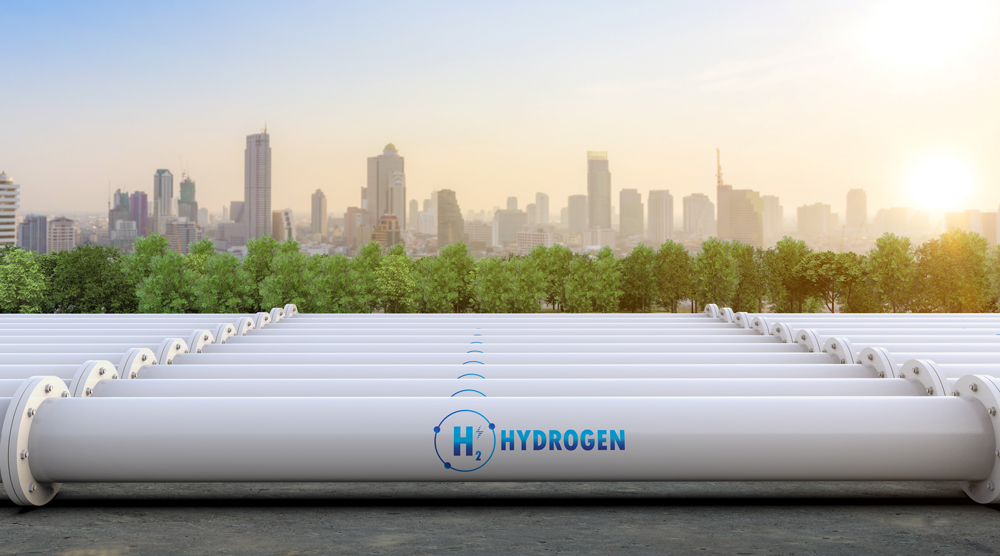Climate Insider Brief:
- The Gulf Coast H2Hub and Midwest H2Hub have finalized agreements with the DOE, becoming the fourth and fifth Regional Clean Hydrogen Hubs to secure funding under the Bipartisan Infrastructure Law, bringing total allocated funding to $7 billion.
- The Gulf Coast Hub received $1.2 billion to serve Houston’s industrial sector, with backing from Chevron, ExxonMobil, and Ørsted.
- The seven H2Hubs aim to produce three million metric tons of clean hydrogen annually, achieving 30% of the U.S. 2030 target, while cutting emissions by 25 million metric tons per year—equivalent to removing 5.5 million gasoline vehicles from the roads.
The United States Department of Energy (DOE) announced Wednesday that the Gulf Coast H2Hub and Midwest H2Hub have finalized federal cost-share agreements, securing a combined $2.2 billion in funding. This milestone marks significant progress in the Biden administration’s strategy to scale clean hydrogen production, with five of the seven planned Regional Clean Hydrogen Hubs (H2Hubs) now fully funded.
These projects are part of a $7 billion investment under the Bipartisan Infrastructure Law to bolster U.S. clean energy infrastructure. The seven H2Hubs are collectively designed to produce three million metric tons of clean hydrogen annually, representing nearly a third of the nation’s 2030 production target.
Spotlight on Gulf Coast and Midwest Hubs
The Gulf Coast Hydrogen Hub, led by GTI Energy, received $1.2 billion, the largest share of federal funding alongside California’s Hydrogen Hub. Located in Houston, the Gulf Coast project aims to capitalize on the region’s position as the energy capital of the U.S., with backing from major players such as Chevron, ExxonMobil, and Ørsted.
The Midwest Hydrogen Hub, spanning Illinois, Indiana, Iowa, and Michigan, secured $1 billion. This initiative is a public-private collaboration that includes ExxonMobil, BP, and Air Liquide, focusing on decarbonizing industrial processes and transportation across the region.
Progress Across H2Hubs
Of the seven H2Hubs announced last year, five have now secured funding:
- California Hydrogen Hub: $1.2 billion, exclusively renewable energy-driven, led by the ARCHES consortium.
- Pacific Northwest Hydrogen Hub: $1 billion, spanning Washington, Oregon, and Montana, involving Amazon and Air Liquide.
- Appalachian Hydrogen Hub: $925 million, covering West Virginia, Ohio, and Pennsylvania, supported by Enbridge and Air Liquide.
- Gulf Coast Hydrogen Hub: $1.2 billion, targeting Houston’s industrial sector.
- Midwest Hydrogen Hub: $1 billion, encompassing four Midwest states.
The remaining projects include the Heartland Hydrogen Hub in the northern Midwest, awarded $925 million, and the Mid-Atlantic Hydrogen Hub, set to receive $750 million.
National Impact of Clean Hydrogen
The DOE underscores the transformative potential of clean hydrogen to decarbonize energy-intensive sectors like heavy-duty transportation and industrial processes. “Clean hydrogen is a flexible energy carrier that can be produced from a diverse mix of domestic energy resources,” the DOE stated, adding that the H2Hubs will also support long-duration energy storage for renewable power.
With a goal to slash clean hydrogen production costs to $2 per kilogram by 2026 and $1 per kilogram by 2031, the H2Hubs aim to position the U.S. as a leader in hydrogen technology. The projects are expected to cut carbon emissions by 25 million metric tons annually, equivalent to removing 5.5 million gasoline-powered vehicles from the roads.
Climate Insider Notes
- The Gulf Coast and California Hydrogen Hubs lead funding, each receiving $1.2 billion.
- Public-private collaborations underscore the role of corporate giants like ExxonMobil, Chevron, and Amazon in clean energy.
- By producing three million metric tons of clean hydrogen annually, the H2Hubs aim to achieve 30% of the 2030 U.S. target.
- The DOE’s hydrogen cost-reduction targets could catalyze widespread adoption and economic competitiveness.
- Projects align with U.S. climate goals, aiming to decarbonize hard-to-abate sectors and create new economic opportunities.
This announcement represents a pivotal step in realizing a low-carbon hydrogen economy, with potential implications for global energy markets and climate action strategies.
Source: Rigzone





